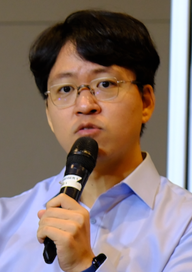Invited Speakers
Alexander Lin
National University of Singapore, Singapore
Biography: Alexander Lin is a Senior Lecturer in Department of the Build Environment at the National University of Singapore (NUS). He holds a Bachelor's degree in Civil Engineering from National Taiwan University and a PhD from the Structural Engineering Mechanics and Materials program at UC Berkeley's Department of Civil and Environmental Engineering. Initially focusing on advanced concrete materials and their applications in structures, his research has evolved to incorporate the innovative use of technology and 3D printing, customizing shapes and details of building components for improved performances. His current work centers on optimizing building configurations, employing advanced algorithms and AI to enhance not only structural performance but also operational performances including acoustic and thermal insulations. He is a co-lead for the Thrust of AM (Additive Manufacturing) Enabled Design and Environment in Centre for Additive Manufacturing in NUS.
Kim Yongmin
University of Glasgow, Singapore
Biography: Dr. Kim Yongmin is an Assistant Professor at the James Watt School of Engineering, University of Glasgow, specifically in Singapore campus. He completed his PhD in the School of Civil and Environmental Engineering at Yonsei University, Seoul, Korea, in 2015. His research lab, Digital Geotechnical Engineering Lab (DGEL), is focused on Urban Disasters & Sustainable Urban Development. The lab uses deep-layered neural networks, machine learning, extensive laboratory experiments, field testing, and coupled multidisciplinary analyses to conduct their studies. Dr Kim Yongmin's research focuses on unsaturated soil mechanics to solve geotechnical problems associated with tropical residual soils. His research emphasis has been on rainfall-induced landslides, one of the major natural disasters occurring in many parts of the world. He has utilized unsaturated soil mechanics principles to better understand the mechanisms of rainfall-induced slope failures, particularly in tropical residual soils. Dr Kim Yongmin and his team have developed several systems, including the Capillary Barrier System (CBS), GeoBarrier System (GBS) for cover systems and retaining structures, as well as a Slope Management and Susceptibility Geographical Information System. They have also applied unsaturated soil mechanics to soil improvement for tree stability, understanding the effects of rainfall on tree stability, and developed instruments for tree inclinometer with the associated analytics.

